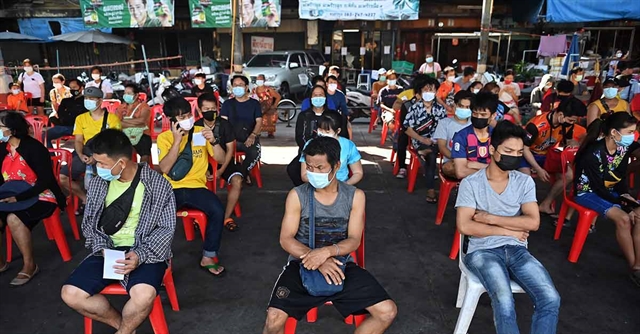 World
World

 |
| Myanmar migrant workers register for testing at a COVID-19 coronavirus mobile testing clinic in Pathum Thani, north of Bangkok, Thailand, on January 10, 2021. AFP Photo |
Vũ Thu Hà
SINGAPORE — The COVID-19 pandemic has demonstrated that migrant workers, despite playing an essential role in regional economic development, are still among the most vulnerable groups with insufficient protection, according to delegates at a regional meeting on labour issues.
Addressing structural weaknesses and strengthening policy and legal frameworks to protect migrant workers constitutes a hot topic of discussion at the International Labour Organization’s 17th Asia-Pacific Meeting (APRM) held in Singapore from December 6-9.
“Migrant workers have been at the frontline of the pandemic, with many countries reporting at least double the rates of infection and mortality amongst migrant communities compared to locals,” said Jean-Christophe Dumont, head of OECD’s International Migration Division. “Many migrant workers have been left without access to health care, or vaccines, resulting in a prolonged pandemic with continuing health, social and economic inequalities.”
A report by ILO Director-General Gilbert F. Houngbo presented at the meeting showed that during the pandemic, migrants were often among the first to be laid off, experience non-payment and under-payment of wages and their circumstances were aggravated by travel restrictions.
Millions of migrant workers across the Asia Pacific and Arab States, home to some of the world’s most significant labour sending and receiving countries, have also been forced to return home to uncertain conditions and greatly diminished job opportunities.
The report acknowledges some of the progress made by regional countries, especially in the Arab States, and South and Southeast Asian countries regarding this issue. These include the introduction of new or improved laws, policies, services and practices to protect the rights of migrant workers, and the efforts to improve the transparency and fairness of the recruitment process.
However, the ILO head said much more needs to be done and it remains a key area of ILO work going forward.
“I do believe that countries need to step up measures to show that there is a minimum protection, first of all, at home for those who are migrant workers," he told the media on the sidelines of the meeting. “Sending countries should also negotiate agreements with receiving countries to make sure that when they arrive in the receiving countries, that they would enjoy the benefits in terms of minimum salary, and then the working condition with respect to fundamentals, principles and rights at work.”
Shayma Al Awadhi, a representative of the United Arab Emirates government, a country that relies on migrant workers, said a lot of efforts have recently been made in the UAE to ensure the rights of migrant workers.
She said: “We have recently launched an unemployment insurance plan, which is something that we have learned from our experiences in the pandemic. This actually protects workers by providing them up to 60 per cent of their salaries for a period of three months. We have strong partnerships with the embassies of the sending countries. And we facilitate with them in case workers wish to return to their own countries. Even during the pandemic, we have established a virtual labour market where employees or workers, who have lost their jobs, were able to apply for temporary employment.”
Delegates called on regional governments to pay more attention to increasing social protection coverage and tailored services for migrant workers to better protect this essential yet vulnerable group.
Jean-Christophe Dumont from OECD’s International Migration Division added: “During the pandemic, for example, Asian countries which have put in place migrant worker welfare reforms or other emergency funds intended to respond to migrant worker emergencies were able to provide better support. And I should say employers are key partners to make labour migration schemes work in practice.”
Meanwhile, Sara Elder, an expert from ILO, suggested that in order to make employers be involved and abide by laws and regulations, more effective monitoring mechanisms should be put in place.
“We know that often times employers are not respecting the rules,” she said. “We need to build up labour market institutions, including the labour inspectorate systems and the labour complaint system, so that there are mechanisms to improve this system. I also think it's time for migrant workers to kind of build up their knowledge of their own rights. New trainings should also be offered to give them information about how they can work together to raise their voice to insist on their rights.” VNS




